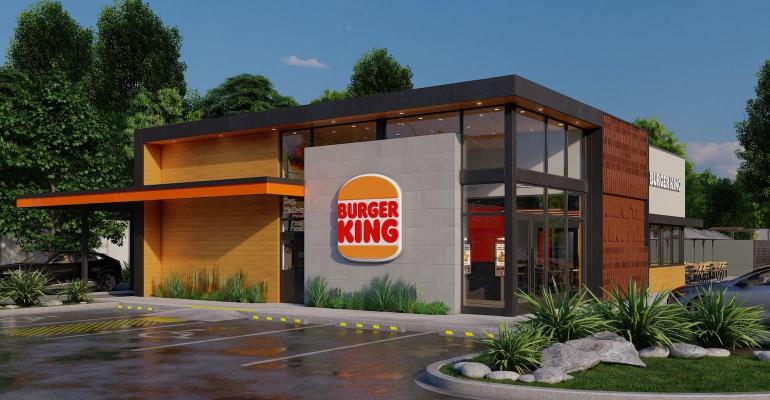Burger King parent Restaurant Brands International Inc. plans to finalize its reduction in under-performing units during the final quarter of the year, intent on starting 2024 with a stronger brand portfolio, executives said Friday.
The Toronto-based company, which also owns the Tim Hortons, Popeyes Louisiana Kitchen and Firehouse Subs brands, released earnings Friday for the third quarter ended Sept. 30, noting that Burger King’s U.S. business had flat traffic in the period.
“Looking ahead, we are expecting roughly $10 million of net bad debt expense in Q4 ‘23 predominantly related to Burger King U.S.,” said Matthew Dunnigan, RBI chief financial officer, on the call. “We have been working closely with franchisees to transition restaurant portfolios into the hands of strong local operators over the past few quarters.
“We prioritized the most distressed situations, closing unviable restaurants and cleaning up a number of portfolios,” Dunnigan said. “We expect to largely finalize the remainder of those workouts and closures by end of year, resulting in elevated bad debt for Q4 but with the benefit of a much-improved foundation entering 2024.”
Burger King’s U.S. business had flat traffic for the quarter, said Josh Kobza, RBI CEO.
Quoting Burger King U.S. and Canada president Tom Curtis, Kobza said: “This is progress not success. … We must be focused on the fundamentals of restaurant execution to achieve our goals. This is supported by continued growth and franchisee profitability, conviction from the franchisees to reinvest in their restaurants, and the development of a new restaurant format known as Sizzle, designed collaboratively with franchisees to improve the guest experience for guests and team members while driving a better return for our franchisees.”
Burger King Corp., which in September 2022 unveiled its $400 million “Reclaim the Flame” initiative to turn around its U.S. quick-service business, plans to evolve the program in the second year with a new Sizzle store design and “You Rule” marketing efforts, Curtis said in October after a franchisee convention in Miami.
The original plan called for RBI to invest invest $150 million in advertising and digital investments ("Fuel the Flame") and $250 million in remodels and relocations, restaurant technology, kitchen equipment, and building enhancements ("Royal Reset").
During the third quarter, RBI funded about $2 million toward the Fuel the Flame digital investment, and $10 million toward the Royal Reset investments. As of Sept. 30, the company had funded $33 million toward the Fuel the Flame investments and $45 million toward the Royal Reset investments.
Kobza said Burger King’s total U.S. restaurant count declined by 2.8% compared with the third quarter 2022 as the company and franchisees closed underperforming locations. The company expected most of its permanent closures will be finalized by the end of the year.
“We're one year into the Reclaim the Flame plan and frankly made more progress improving franchisee profitability and traffic in this one year than originally expected,” said Patrick Doyle, RBI executive chairman. “We've also taken difficult but important steps this year to work through several distressed situations with franchisees and reposition restaurants into the hands of stronger local operators.”
Kobza said he and Doyle recently attended an international Burger King franchisee convention in Paris.
“We saw first-hand why this business is well-positioned overseas,” Kobza said, noting that more than 75% of international Burger King units have the modern image “and with this generally comes a more digital guest experience, including having kiosks and over 50% of international sales [are] through digital channels and that number is closer to 90% in some markets like Korea and China.”
Digital sales, he added, deliver a better experience for guests and team members and higher average checks and frequency for restaurant franchisees.
“Our team is in the process of rolling out a new proprietary operating system that further streamlines back-of-house flow for team members,” Kobza noted. “We expect to have the Dynamic Service System, or DSS as we call it, in over 2,000 restaurants by the end of 2023 with a path to 100% in the coming years. We've already seen solid results from DSS internationally, including a 3% comparable sales uplifts on average and mid-single-digit improvements in speed of service.”
RBI’s Tim Hortons brand recorded better-than-expected same-store sales growth of 6.8%, as the brand's coffees, cold drinks, and breakfast sandwiches attracted more customers and it worked to expand to other dayparts, executives said.
For the third quarter ended Sept. 30, Restaurant Brands International’s net income was $364 million ($252 million attributable to common shareholders), or 79 cents a share, down from $530 million ($360 million attributable to common shareholders), or $1.17 a share, in the year-ago period. Revenues were up to $1.837 billion from $1.726 billion in the same period a year ago.
Same-store sales were up 7% systemwide with increases of 7.2% at Burger King, 7% at Popeyes, 6.8% at Tim Hortons and 3.4% at Firehouse Subs. Same-store sales by geography included increases of 8.1% at Tim Hortons Canada, 7.6% at Burger King International, and 6.6% at Burger King U.S., the company said.
As of Sept. 30, RBI had 30,375 restaurants, including 19,035 Burger Kings, 5,701 Tim Hortons, 4,373 Popeyes and 1,266 Firehouse Subs.
Contact Ron Ruggless at Ronald.Ruggless@Informa.com
Follow him on X/Twitter: @RonRuggless




